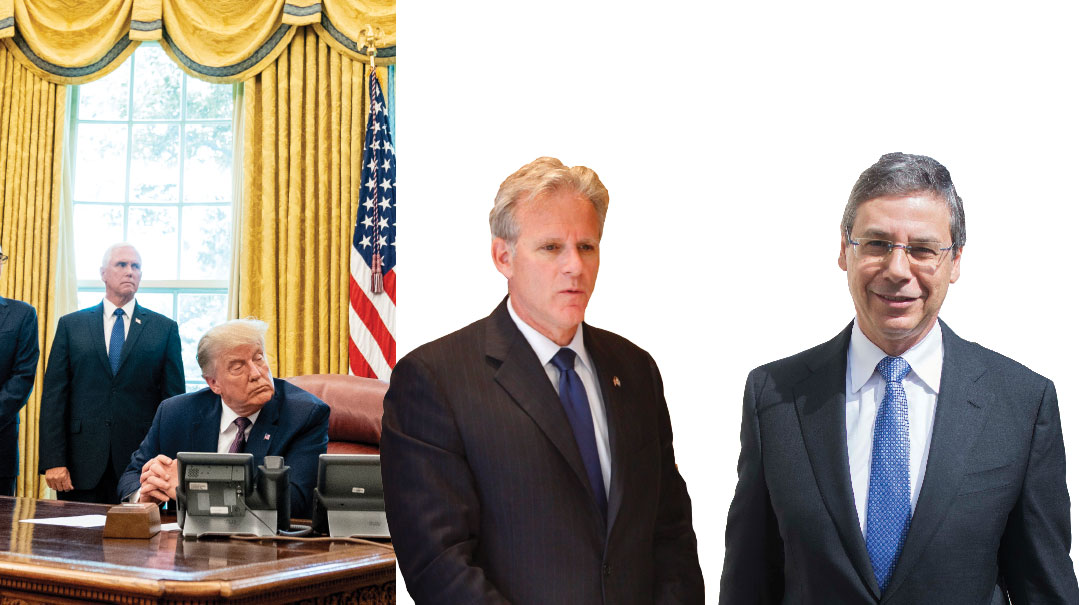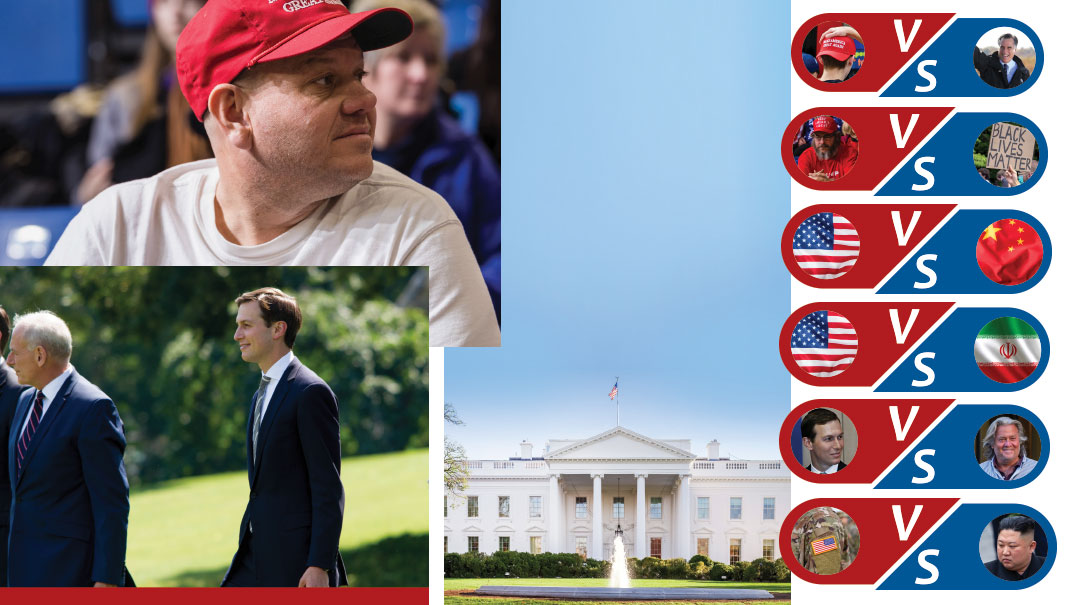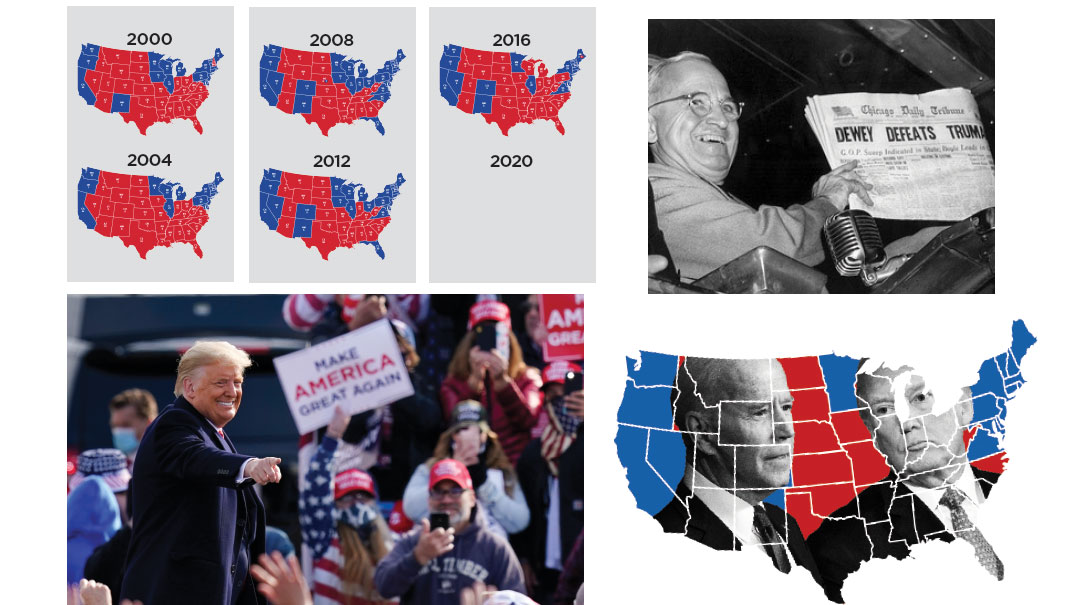Diplomatic Forecast

How will next Tuesday’s result affect these treaties? What will become of the Israeli-Palestinian conflict? For some predictions, we turned to two former Israeli ambassadors to Washington, Michael Oren and Danny Ayalon

Diplomatic Forecast
In less than a week, the presidential campaign will end. As of this writing, early voting has already amounted to 42% of 2016 total turnout, and could rise to 50% by the time you read this.
The outcome will impact not only the US economy, the COVID-19 response, and the Supreme Court, but foreign affairs as well. Over the past few months President Trump launched a Middle East diplomatic blitz, clinching a flurry of unprecedented peace deals. Israel has now normalized ties with the UAE, Bahrain, and Sudan, a significant strategic shift that builds a united front against the Iranians.
How will next Tuesday’s result affect these treaties? What will become of the Israeli-Palestinian conflict? For some predictions, we turned to two former Israeli ambassadors to Washington, Michael Oren and Danny Ayalon.
Ambassador Michael Oren
Michael Oren served as Israel’s ambassador to Washington during Obama’s first term, from 2009 to 2013.
“I know Biden and Harris well,” Oren tells Mishpacha. “They’re both very pro-Israel. They were among the only candidates [in the Democratic primaries] who said they wouldn’t leverage aid to extract concessions from Israel. But there are disagreements on two issues.
“First, the Palestinians. It’s obvious that Biden won’t accept the Trump peace deal. He’ll revoke the decision to close the Palestinian embassy in Washington and the US consulate in East Jerusalem, and resume economic aid to Palestinian organizations and institutions.”
Oren emphasizes that this aid will have to comply with the Taylor Force Act, which prohibits funding organizations that provide stipends to terrorists’ families.
The second area of discord, says Oren, centers on Democrats’ opposition to expanding Israeli settlements, including building in East Jerusalem.
“But it won’t be like Obama,” he clarifies. “Obama put a strong emphasis on this. Still, if someone tries to pass a condemnatory resolution against us in the Security Council, I’m not sure they [Biden and Harris] will veto it. I wouldn’t count on it. In addition, the two-state solution, under the Clinton-Obama parameters [meaning the ’67 borders], will return to the agenda.”
But Oren emphasizes that although the United States’ declared positions on the issue would change under a Biden administration, it wouldn’t become a high priority issue. “If Biden wins, he’ll have his hands full with America’s domestic issues — economic, political, and social crisis. He won’t have much time to spare for us, and even in foreign affairs we’re fairly low priority. What they care about is relations with China, Russia, and NATO.”
A much more important and controversial issue, from Israel’s perspective, is Iran.
“Biden and Harris both support reentering the Iran nuclear deal and canceling sanctions,” says Oren. “That puts them on a collision course with Israel. We were extremely grateful for America’s withdrawal from the deal — this is a security issue, not a political one. It’s strategic. I don’t express opinions on political matters, but this is a matter of life and death.”
Oren believes that Biden and Harris, if elected, will attempt to improve on the deal reached by Obama. “They’ll attempt to place restrictions on Iran’s ballistic missile program, increase inspections and oversight over nuclear sites, and maybe push off the sunset clauses.”
How would this affect Israel’s relations with the Gulf States?
“In a variety of ways. If the United States rejoins the nuclear deal, this will push other Gulf States into alliance with Israel. On the other hand, I’m assuming a Democratic administration wouldn’t invest too much in strengthening and developing these ties. That’s not their focus. There are voices in their circle saying it’s just a distraction from the main issue, which is the Palestinian conflict. If we place too much hopes on ties with the Gulf States, we’re liable to be disappointed.”
And if Trump wins?
“If Trump wins, Iran will be a very high-priority issue, because he’s said he would like to reach a deal with them. We have to spell out our interests in such a deal. In 2015 we didn’t spell out our interests, and Obama was able to claim that no deal would be accepted by Israel. Meanwhile, if the Palestinians decide they want to return to the negotiating table, they’ll discover a president who’s thinking about his legacy and who will be happy to make a deal with them. He won’t have to worry about reelection, and he’ll be free to focus on his legacy. After all, he’s already changed the face of the Middle East.”
Ambassador Danny Ayalon
Danny Ayalon served as Israel’s ambassador to Washington from 2002 to 2006.
“I think that on a basic level, it’s in America’s national security interests to have a strong and stable Israel and healthy bilateral ties,” Ayalon tells Mishpacha. “First of all, there’s the ethos of a democratic state, which is very meaningful to them. A democratic country is a healthy country that consumes American products. Israel is the biggest consumer of American products in the Middle East. In addition, Israel has contributed greatly to American national security in terms of missile defense technologies. The US Army purchased an Arrow anti-ballistic missile battery from Israel, in addition to help with cyber, counterterrorism, and intelligence.
“So our countries have a lot in common,” he says. “But of course the candidates have very different approaches. Trump really does represent the most pro-Israel position there ever was in the White House. He sees the Middle East through an Israeli prism, in terms of Israel’s security interests — whether it was the Iranian nuclear deal, the Golan, Jerusalem, or the deal of the century. He’s the first who doesn’t just pay lip service to our security needs, but who really feels them.”
Ayalon says there’s no question that a Biden victory would bring a definite change of tone. “Trump’s peace plan turned America’s Middle East policy on its head. Prior administrations spoke of solving the Israeli-Palestinian conflict first as an essential prerequisite for regional stability. Trump said, let’s go the other way around. Clearly the Palestinians aren’t interested in carrying on any meaningful dialogue. We’ve seen the fruits of this approach over the past few weeks.”
According to Ayalon, a second Trump administration would be eagerly received in Jerusalem. “The fact that the Iranians are praying for his defeat demonstrates that his campaign of maximal pressure is working and that it’s imperative that it continue. He said he’ll offer the Iranians a deal, but I have no doubt that he’ll do so in total coordination with Israel.”
And what would Biden do about Iran?
“Biden says he’ll rejoin the nuclear deal, but it’s no longer clear if that will be an automatic move.” Ayalon also points out that Biden would have an opportunity to make tweaks to the deal before rejoining it. “More inspections, ballistic missiles, oversight of Iran’s sponsoring of terrorism. Biden will have a chance, because he has the backing of the Europeans. Paradoxically, maybe Biden could pressure the Iranians more [than Trump], because he has the Europeans.”
The two former ambassadors disagree about the ongoing normalization with the Arab world. Oren believes that Biden would have no motivation to pursue this; Ayalon argues that a Biden administration could also benefit from it.
“There’s no question Biden will continue the dynamic started by Trump with the Arab world. He even congratulated him — which is a first — for the peace deal with the UAE. It’s in America’s interests to continue this and to add more countries. It provides a measure of stability to the Middle East and creates a bloc of pro-American countries that could also resist Chinese and Russian influence in the region.”
He agrees that the Palestinians won’t be a Biden administration’s top priority, but believes that Biden would pressure Israel much more than Trump has. “He’ll pressure us to not expand the settlements, and to limit building in existing settlements. This could be a dangerous point of friction. American defense in the UN won’t be as automatic under Biden as it was under Trump.
“And regarding the Palestinians, he’ll bring back the Clinton parameters — the ’67 borders, territorial exchanges, and a Palestinian East Jerusalem. But I’m not sure he’ll press too hard, because it’s not clear that the Palestinians are a partner. Given the tectonic shifts going on in the region, the Palestinian conflict won’t stand at the center. There will be a change in tone, but I don’t see it translating into massive pressure for serious concessions.”
(Originally featured in Mishpacha, Issue 833)
Oops! We could not locate your form.










